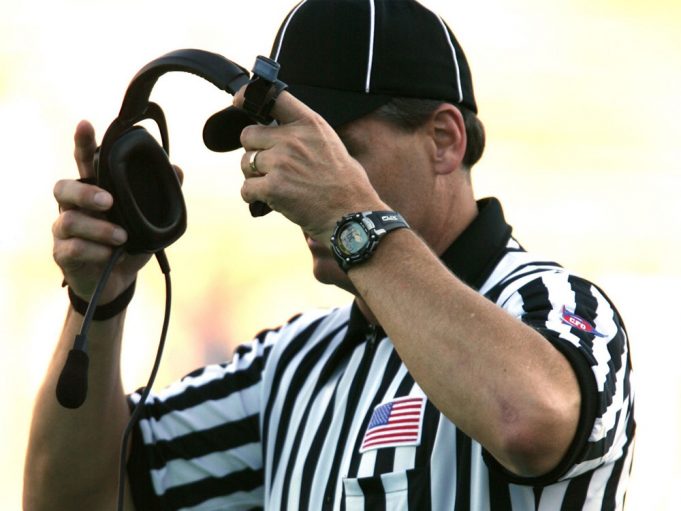No matter what sport you officiate, or even at what level, technology has become an integral part of sports. You have heard the popular expression, “Get with the times!” Well the times are all about technology, and sports are not any different. Teams — coaches, athletes, athletic trainers, scouts, managers, doctors, owners, etc., are using technology in a variety of ways for the improvement and betterment of their teams. Leagues and officiating crews have had to follow those leads, accepting and using technology in order to adapt to changes in their sports. And of course, the fans of those sports have stayed in tune with the changes, and in some respects are better armed than some of the teams and sports. That is when things can get hairy and even scary for officials at live games.
Today’s fans can see more than the officials can, which can make the officials’ lives a living hell for the rest of a game should they make an incorrect call or miss something.
On June 2, 2010, MLB umpire Jim Joyce made an incorrect call at Comerica Park in Detroit. That game is known as the “28-out perfect game.” Tigers pitcher Armando Galarraga, vying to pitch a perfect game, retired the first 26 batters. Then Joyce ruled that Cleveland’s Jason Donald reached first base safely, despite irrefutable evidence he should have been out. Galarraga should have been credited with tossing a perfect game. Joyce would later acknowledge his blunder and was apologetic for his mistake, even fighting back tears. Even though Galarraga was forgiving, and Joyce handled the situation in a professional manner, Joyce has to live with that error forever.
One of the issues that officials face in today’s world when it comes to technology is the pressure of getting things perfect. Humans make mistakes and technology makes mistakes more obvious. It is as if technology in its own way has raised the bar when it comes to human error — always get things right. How can there not be pressure on officials, especially when almost everyone in attendance at games has access to Internet on their phones, and can watch things in replay from many different angles? That is a whole lot of scrutiny to deal with if you are an official.
Dealing with Scrutiny
One of the best ways for dealing with scrutiny is to prevent it if at all possible by using technology to your advantage. Most sports at all levels have incorporated it into their protocol before, during and after games to improve officiating. Yet, there are still some officials and umpires who are “old school” and would rather not use technology, or when they do, use it to a minimum. Yes, there are many detractors of technology who wish that sports did not use technology; after all sports were never meant to be video games, right? Whether or not you embrace technology in sports, it can definitely be used to your benefit when you are open-minded.
Humans make mistakes and technology makes mistakes more obvious.
One of the most difficult things with being an official is making an incorrect call by missing things on the field or court, or letting your emotions influence you. Whenever you have the opportunity to use technology during the game, use it. It is better to get things right, even if it means slowing down the game to use instant replay to assist. It is definitely not fun being wrong, especially when teams and fans can see the replays on screens as well as their phones. Some officials can be stubborn and stand by their call even though it is wrong. Check with your crew of officials, as well as instant replay whenever possible and get it corrected.
The biggest thing to know and always remember is that you are human and that you will make mistakes. Other people may get angry and be unforgiving, and that is their right. You have the right to move on — not necessarily forget it. You can use it to not only make you a better official in how you respond and react to your critics, but also in how you deal with stressful situations in your life. No matter where you go, you take you with you.
Why hold on to mistakes?
Have you ever felt like no matter what you are doing or how hard that you are trying to let go of your mistakes, you just can’t seem to? Ironically, the harder that you try to let go, the more that you feel stressed out. Whether the call had a major impact or minor impact that you missed, you just can’t let it go, or worse yet, will not let it go. Why? Simple! Your ego keeps getting in the way.
The term or concept “ego” is a psychological term associated with Sigmund Freud’s aspects of one’s personality — ID, ego and superego. For the purpose of this article and the way ego is often portrayed or conceived in the world outside of Freudian psychology is more about control … feeling the need to be in control of self and/or others. Ego is often based on focusing on one way only. When you do that, it becomes extremely detrimental and usually leads to overwhelming stress in one’s life.
Today’s society places a big emphasis on being right and knowing how to do something efficiently 99.9 percent of the time. Yes, you guessed it — technology has a lot to do with that. Furthermore, one’s ego is often equated with level of competency. If there is another way to do something outside of the way you know or have been taught, or the way you’ve become fixated on (another Freudian term equated with being obsessed about something), then that must either make someone else’s ways of doing things wrong or you incompetent.
Guess what? If you are an old-school official, technology in officiating goes against most of what you believed about sports. Moreover, you are an official — your opinions and judgments matter, because that is what you are doing: making judgment calls. Then along comes technology, forcing you to compromise and even question your judgments. That is where the ego comes in.
Your ego must prove that it is correct to protect itself from feeling inadequate, insufficient, wrong and worthless. So, it tries at all costs to hold onto something, even if it is wrong, because you embrace it as both you and your integrity. When you can’t or won’t let go, you then possess what is called an enflamed ego and that is when stress (the distressing variety) starts to make you anxious, doubting yourself and judgments, and leads to you lacking confidence in what you are good at — officiating.
Most people who have a difficult time letting go of their mistakes get stuck in “all or nothing” ways of thinking. They operate in a mindset of polarized thinking, which is at the root of their ego, preventing them from just letting go. For them, everything is either right or wrong, black or white, good or bad, etc. Of course their egos desire to be on the “right” side, so they try to play things over in their minds until they can make it right for themselves.
Furthermore, the ego will take whatever it can to prove itself worthy and righteous, even if it means going against admitting defeat and seeking help. When you are driven by ego and get trapped, the stressed ego moves into a state of tunnel vision and it only sees one way.
Let go of mistakes
The best way to let mistakes go and unburden yourself from brooding about incorrect calls and imperfections is to not take everything personally. Being led by your ego is all about taking things personally. We tend to place people’s actions and thinking/ talking about us into our way of thinking and perceiving which causes continual rumination on our past errors. As soon as you are able to stop taking things personally, you stop being egocentric. Too often we hope and look to others to understand us, and accept everything we do or say. The reality is most won’t.
Some great minds in self-help and self-esteem building have stated, “Life is 10 percent what happens to us and 90 percent how we respond to it.” That is so true. One official can have the most stressful game he or she has ever officiated and not be fazed. Other officials can have something so minutely influential happen in their game that they fly off the handle. Often that stress is caused by their perception of what is going on around them and knowing how (or not knowing how) to handle it. Perception is all based on the choice for how you respond to any and all situations.
Your ego must prove that it is correct to protect itself from feeling inadequate, insufficient, wrong and worthless.
The key to responding, coping and letting go of mistakes is to look beyond the situation. That means seeing yourself outside of it. What that situation means to you may mean something different for someone else. That means it is not the situation that matters most, rather your perception of the situation. You first need to collect your thoughts before responding to any situation.
Officials who continually allow stress to get the better of them are more likely to handle situations during a game, or thereafter from a knee-jerk reaction based on prior stressful experiences. Those prior experiences are often driven by emotions that were based negatively on previous outcomes. Unfortunately, officials who get caught up in negative mindsets develop habits of carrying emotionally charged perceptions and memories forward with them and use them to handle present and future game situations, and life for that matter.
Getting over it
The key to coping or overcoming negative officiating experiences is to look at each situation as different from others because they are — different games, stadiums, casts of characters involved, etc. Each game you officiate should have its own sets of concerns, and those concerns should have you focused in the present moment and treat the moment as a unique experience. Only after you have treated the current experience as a unique situation do you explore the possibilities for dealing with it based on past perceptions that were favorable and applicable. What is most important here is to remember that your past perceptions from games are not the same as your current perceptions, so avoid living in the past!
Does technology belong in today’s sports? The millennials are all about technology, and since they are the current and future fans of sports, then perhaps the answer is yes. Can technology be helpful for officials? You bet it can. The key is to allow it to work for you, rather than trying to work against it. Moreover, should you make mistakes because of technology, or it “shows you up,” remember that before technology came along, officials made mistakes because they are human.
What's Your Call? Leave a Comment:
Note: This article is archival in nature. Rules, interpretations, mechanics, philosophies and other information may or may not be correct for the current year.
This article is the copyright of ©Referee Enterprises, Inc., and may not be republished in whole or in part online, in print or in any capacity without expressed written permission from Referee. The article is made available for educational use by individuals.



















